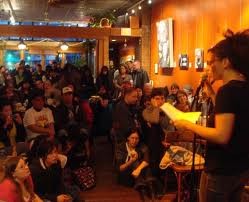The 'triage' of 'Triage'
On Cecily Nicholson

Here’s a simple pleasure: a few words on what’s perhaps my favorite book of poetry from last year, Cecily Nicholson’s Triage (Talon Books 2011). And it’s a nice fit with this series of commentaries, as Cecil’s is perhaps the very embodiment and quintessential example of what I’m calling “neighbouring zones”—the sometimes overlapping, temporarily concatenated realms of art and activism, poetry and revolution. Long both a poet and an activist/community organizer, Nicholson’s poetry simmers up out of ten years of social work in Vancouver’s notoriously fraught Downtown East Side (“Canada’s poorest zip code,” as it’s often proclaimed).
Such biographical information doesn’t always impress, and isn’t always all that informative—and Nicholson herself might not appreciate my mentioning it—but what I’m fascinated by in her work is its tangled concatenations—the “triage” it performs at once on language, history, and a community under constant assault from developers, bureaucrats, poverty, illness and a disinterested “public.” It’s a matter of resisting in language, and simultaneously resisting language—its co-optations and erasures.
There are poems here that pulsate with the life (and death) of the streets, poems that clearly arise out of organized resistance to the Olympics and rampant gentrification, out of the repercussions of Vancouver’s devastating mining industry (what finance capital is to New York City resource extraction is to Vancouver), and out of the struggles of immigrant life. Everywhere social devastation is brought forward through a broken language that is at once fracturing and reforming into new wholes. I’m going to look at just one poem here—a small poem (many of the poems in Triage are longer sequences) from the middle of the collection which draws so many of the strands of Nicholson’s work together, exemplifying her poetics of “triage” (damage control/damage repair).
Landing
Paint beautiful ceiling history assumes
Empty names too labour intensive
Continuing journeys in the hold lists water
Holding cells at Elmina market place
Harmony armada gross supremacy
Temporary tents tourist information
Industry aura articles legless glory
Endures houses empty of blankets
Ordinance curfews leash law park rules
In effect no organized gathering without permit
Stirred investment due west gesture
Return empty equity bases are sameness
Static currency train creeps imperfect
Activities echo last spectre spoke derail
Set afire property secure a priori
Breeding lilacs by the bloody wall
In I own exiles rotten world hate
“So callous a code as gain” undefined terminus
We detach from painted background
May your road be fulfilled
May you grow old as ritual poetry
In a poem like this, it’s as though dislodging any word from the discursive edifices we walk past daily, prying up any stone on any urban sidewalk, reveals compressed layers of history’s exploitations and exclusions. We move quickly across time and space—beginning in the “Elmina market place,” that first colonial port in Africa through which so many African’s were “exported” as slaves, to a contemporary “market” where tourism (“tourist information”) and real estate speculation (“houses empty” / “empty equity”) dominate—a location I have to peg as contemporary Vancouver, a landscape “set afire” by “property.” Along the way war (“armada gross supremacy” / “legless glory”) and nation building (that cliché Canadian marker of the “last spike”—the mythologized completion of the national railway that supposedly “united” the country—here fractured, “echo last spectre spoke derail,” by the ghosts of immigrant labour who brought the project to conclusion) are swept up in the “callous code” of “gain.”
This last line comes from Amiri Baraka’s poem “A Contract. (For the Destruction and Rebuilding of Paterson.” Suddenly a space is revealed in which history, race, and poetry entangle (Paterson of course invokes Williams and Ginsberg, and those “lilacs” might spring from Eliot, but in this poem they sound more of Whitman)—and poetry is called upon to do significant work, not the least of which is given expression in the prayer of the closing lines. This is where Nicholson’s work takes us—across history, through language and fragmentation and suffering, to sometimes arrive at a place of healing. The poem is both wound and medicine. The patient must be treated fast, decisions made—can this one be saved? I find, reading this work, that I am asking this of poetry itself each time too: can this patient be saved?
Robert Duncan once grandly declared that he “made poems” the way “other men made war” or “love”—“to exercise my faculties at large.” I’ve always found this…a bit too much. But it does come to mind reading Nicholson’s poetry, and makes me think that we can read there the exercise of social faculties that otherwise engaged might make war, love, or perform triage on damaged bodies. The “neighbouring zones” that this poet has passed through—sometimes on a daily basis—reveal an overlapping in which poetry possibly can become social work.
Neighbouring zones